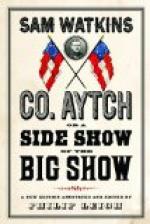The review, he said, could not go to press without an article on the concert, but to do this article he must consult Mr. Innes, for in the first piece, “La my,” the viols had seemed to him out of tune. Of course this was not so—perhaps one of the players had played a wrong note; that might be the explanation. But on referring to the music, Mr. Innes discovered a better one. “From the twelfth to the fifteenth century, writers,” he said, “did not consider their music as moderns do. Now we watch the effect of a chord, a combination of notes heard at the same moment, the top note of which is the tune, but the older writers used their skill in divining musical phrases which could be followed simultaneously, each one going logically its own way, irrespective of some temporary clashing. They considered their music horizontally, as the parts went on; we consider it vertically, each chord producing its impression in turn. To them all the parts were of equal importance. Their music was a purely decorative interweaving of melodies. Now we have a tune with accompanying parts.”
“What a wonderful knowledge of music your father has, Miss Innes!”
“Yes, father reads old MSS. that no one else can decipher.”
“These discords happened,” Mr. Innes said, as he went to the harpsichord, “when a composition was based upon some old plain song melody, the notes of which could not be altered. Then the musician did not scruple to write in one of the other parts the same note altered by a sharp or flat to suit the passing requirement of the musical phrase allotted to that part. You could thus have together, say an F natural in one part and an F sharp in another. This to modern ears, not trained to understanding the meaning of the two parts, is intolerable.”
While he spoke of the relative fineness of the ancient and modern ear, maintaining that the reason ancient singers could sing without an accompaniment was that they were trained to sing from the monochord, Owen considered the figure of this tall, fair girl, and wondered if she would elect to remain with her father, playing the viola da gamba in Dulwich, or bolt with a manager—that was what generally happened. Her father was a most interesting old man, a genius in his way, but just such an one as might prove his daughter’s ruin. He would keep her singing the old music, perhaps marry her to a clerk, and she would be a fat, prosaic mother of three in five years.




